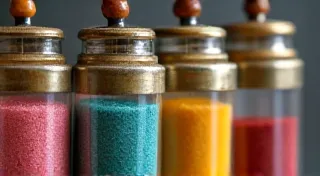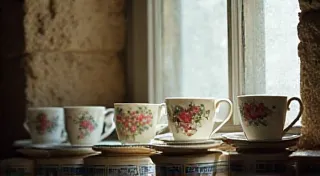A Pet’s Chronology: Integrating Herbal Remedies Across Life Stages
There’s a peculiar beauty in witnessing the passage of time, especially when reflected in something enduring. Think of an antique accordion, its bellows worn smooth by countless hands, its keys responding to a melody played decades ago. The subtle patina of age isn't a sign of decay; it's a testament to resilience, a chronicle of joy and perhaps a touch of melancholy. Similarly, our beloved pets experience time in a unique and profound way. Their needs aren't static; they evolve as they journey through puppyhood, adulthood, and the golden years. Just as a skilled restorer meticulously preserves the integrity of an accordion, we can thoughtfully integrate herbal remedies to support our pets’ well-being across their life stages.
My grandfather, a carpenter by trade, possessed an old Hohner accordion he’s acquired from an estate sale. He wasn’t a musician, but he's captivated by the sheer ingenuity of the mechanism – the complex interplay of reeds, buttons, and bellows. He’s spent years simply admiring it, occasionally attempting a simple tune, always careful to respect its history and fragility. He shared a thought with me once: "Everything tells a story, if you know how to listen." This sentiment resonates deeply when considering our pets. We want to listen to their bodies, to their needs, and to offer them gentle, natural support as they navigate the challenges of aging.

Puppyhood & Kittenhood: Foundations for a Healthy Future
The early years are critical. Just as a well-constructed accordion benefits from careful handling and regular maintenance, a young pet’s foundation for health is built during puppyhood and kittenhood. They’re developing their immune systems, establishing healthy gut flora, and experiencing rapid growth. Herbal remedies at this stage aren’t about treating illnesses; they’s about gently nurturing and supporting those foundational processes.
Chamomile, for example, can be a calming addition to a young pet's routine, especially those prone to anxiety during training or socialization. A very dilute chamomile infusion (cooled completely, of course) can ease nervous energy and promote restful sleep. Calendula, known for its gentle healing properties, can be added to their water to support skin health, which is particularly beneficial for young animals prone to allergies or minor scrapes. Always introduce herbs slowly and in very small amounts, observing for any adverse reactions.
Consider the complexity of a good accordion. It’s not simply a collection of parts; it’s a delicate balance. A slight misalignment in one reed can throw off the entire tune. Similarly, a young pet's system is incredibly sensitive, and what might be beneficial for an adult could be overwhelming for a puppy or kitten. Dilution is key, and observation is paramount.
Adulthood: Maintaining Peak Performance & Preventing Issues
Adulthood, for both pets and accordions, is a period of relative stability. The initial construction is complete, and the focus shifts to maintenance and addressing any emerging issues. Adult pets are generally at their peak physical condition, but the stresses of daily life – exercise, diet, and environmental factors – can take a toll.
For dogs, nettle leaf, a rich source of vitamins and minerals, can be added to their food to support overall health and vitality. For cats, a small amount of catnip (always monitored) can provide enrichment and relaxation. Rosemary, in very small doses, can support kidney function, especially in active or working animals. The key here is to be proactive, addressing potential issues *before* they become problems. Think of it as tuning an accordion – regular adjustments keep it playing smoothly.
My grandfather often says that restoring an accordion isn't just about fixing broken parts; it's about understanding its original intention – the joy it was designed to bring. Similarly, herbal remedies for adult pets are about honoring their natural instincts and supporting their innate ability to heal. It's about recognizing that they aren't just pets; they're complex, sentient beings deserving of our attentive care.

Senior Years: Comfort, Support, and Gentle Relief
The senior years are a time of graceful aging, a period characterized by wisdom, experience, and, inevitably, a slowing down. Just as an antique accordion might show signs of wear and tear after decades of use, our senior pets may experience age-related challenges – joint pain, decreased mobility, digestive issues, and cognitive decline. It is a time for even greater attentiveness, to listen ever more carefully.
Turmeric, with its powerful anti-inflammatory properties, can be a valuable addition to a senior pet's diet to help manage joint pain and stiffness. Ginger can also offer relief from inflammation and aid digestion. Marshmallow root, known for its soothing effect on the digestive system, can be beneficial for seniors with sensitive stomachs. For cognitive support, Ginkgo biloba (in extremely diluted and carefully monitored amounts, *always* under veterinary guidance) may offer some benefit, though its efficacy is debated.
Restoring an old accordion requires a reverence for its history, a willingness to accept its imperfections, and a commitment to preserving its essence. Similarly, caring for a senior pet requires empathy, patience, and a deep understanding of their changing needs. It’s not about trying to turn back time; it's about making their golden years as comfortable and fulfilling as possible.
One of the most rewarding aspects of my grandfather's accordion restoration hobby is the realization that these instruments, despite their age and imperfections, still hold the power to evoke emotions and create beauty. Our pets, too, regardless of their age or health challenges, continue to enrich our lives in countless ways. A quiet moment, sharing a gentle cup of herbal tea – tailored to their specific needs – can be a powerful expression of our love and appreciation.

The journey of a pet, like the history of an accordion, is a tapestry woven with moments of joy, resilience, and unwavering connection. By understanding their unique needs across the stages of life and offering gentle, natural support, we can honor their story and strengthen the bond that makes them such cherished members of our families.





